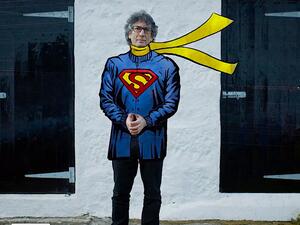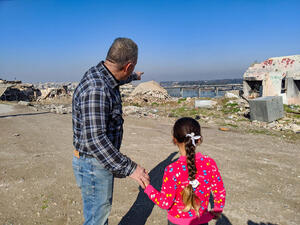Separated Iraqi families fear for relatives after fleeing Sinjar
Separated Iraqi families fear for relatives after fleeing Sinjar

Members of an ethnic Yezidi family sleep in the shade in Shekhadi village after fleeing Sinjar. Close to 400 families are in Shekhadi, normally a place of pilgrimage for the Yezidi.
SHEKHADI, Iraq, August 6 (UNHCR) - It's impossible to know how many people are now staying in this tiny mountain village in northern Iraq. Hundreds, maybe thousands line the lane weaving through Shekhadi, a place of pilgrimage for Iraq's Yezidi minority.
Mothers rock their infant children in wooden cradles, families sleep on mats laid on concrete in the shadow of stone buildings or in the shade of trees. Most appear to be waiting, hoping for good news from their home city of Sinjar, located 280 kilometres due west in Ninewa governorate.
Na'am, a mother of seven, sits on a rock, hand on her chin, visibly distraught about her family, most of whom are stranded in the mountains north of Sinjar. She came here to the Yezidi shrine community with only one of her children. Four other sons, and her two daughters remain in the Sinjar mountains.
According to officials in the Kurdistan Region of Iraq, at least 45,000 Iraqis, including Arabs, Christians and minority Yezidis, Shabak, Shia Turkmen and others, have fled into the region since Sunday to escape armed groups that took over Sinjar and two other communities. Iraqi Kurdistan is already home to more than 300,000 Iraqis displaced since June, and a further 220,000 Syrian refugees, and is feeling the pressure on its already limited resources.
The UN refugee agency and other humanitarian agencies are responding. Today, hundreds of the newly displaced queued at a sports field in the nearby town of Shekhan, leaving with UNHCR mattresses, fans, jugs, soap and other items distributed to support a thousand families.
41-year-old Yusif, an English teacher from Sinjar, was more fortunate than many of his neighbours. His entire immediate family of seven is with him, and they were able to flee with their documents, making it easier to register for aid.
Like many others, he's staying with cousins in Shekhan, a predominantly ethnic Yezidi community. He says others from Sinjar, "Have nothing. This aid is essential for them because they don't have a house; they are in schools, or who knows where."
But Yusif, like so many others who have found comparative safety in the Kurdistan region or elsewhere in Iraq, remains deeply worried about relatives, friends, and neighbours left behind. Government officials say at least 30,000 people from Sinjar fled into a mountain range north of the city.
Yusif has been calling relatives stranded in the mountains every day. "They are outside in the sun and sleeping under the moon," he says. "Some are living in caves. They have a bit of food and water, but are running out."
In Shekhadi, Na'am also worries about her missing relatives amid reports that children have died in the mountains. "I spoke with them yesterday," she says. "But now I can't get through. I think their mobile phones have no more power." The last time she spoke with them was Sunday, when they told her they were running out of food and water.
By Ned Colt in Shekhadi, Iraq








